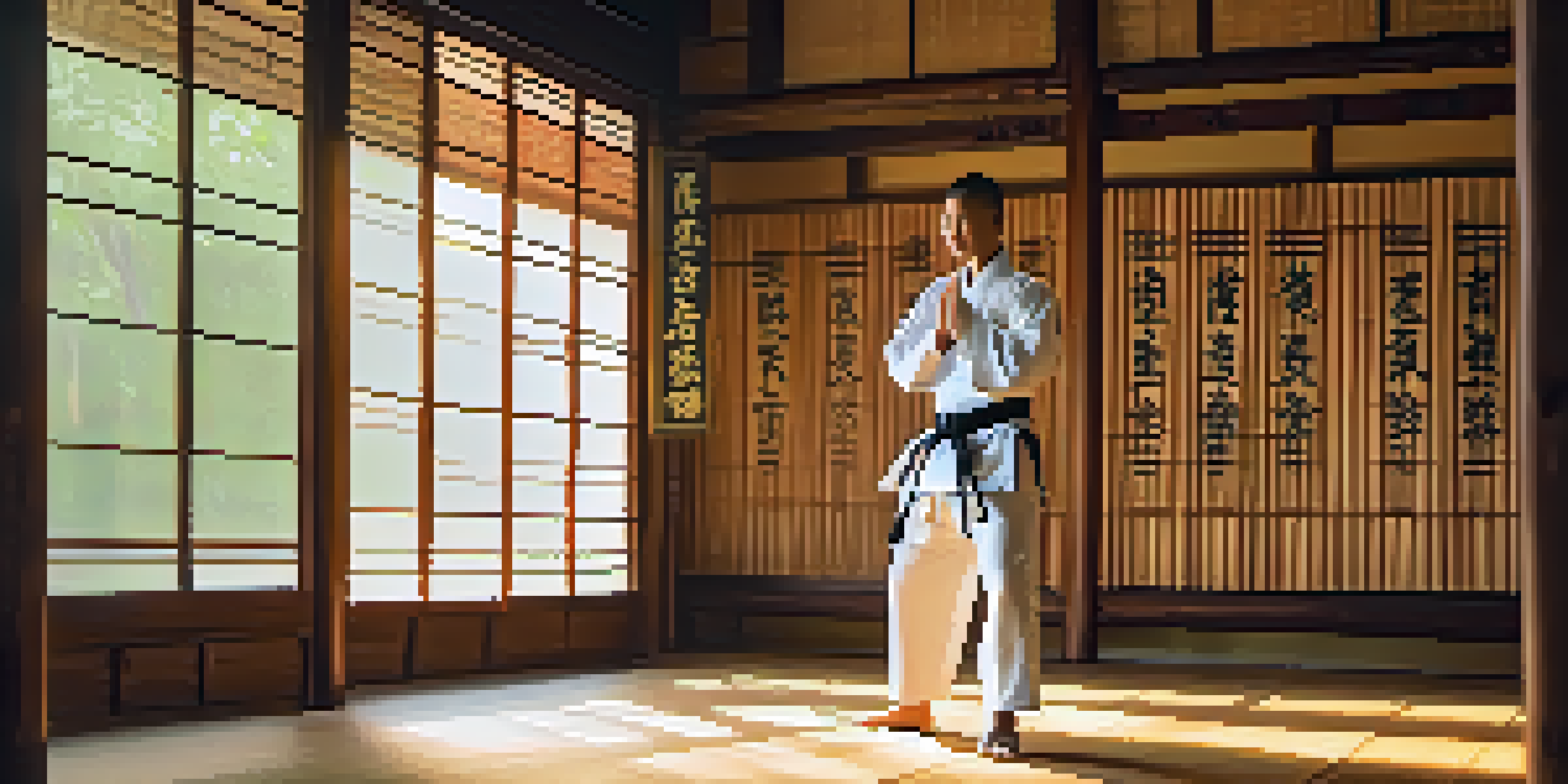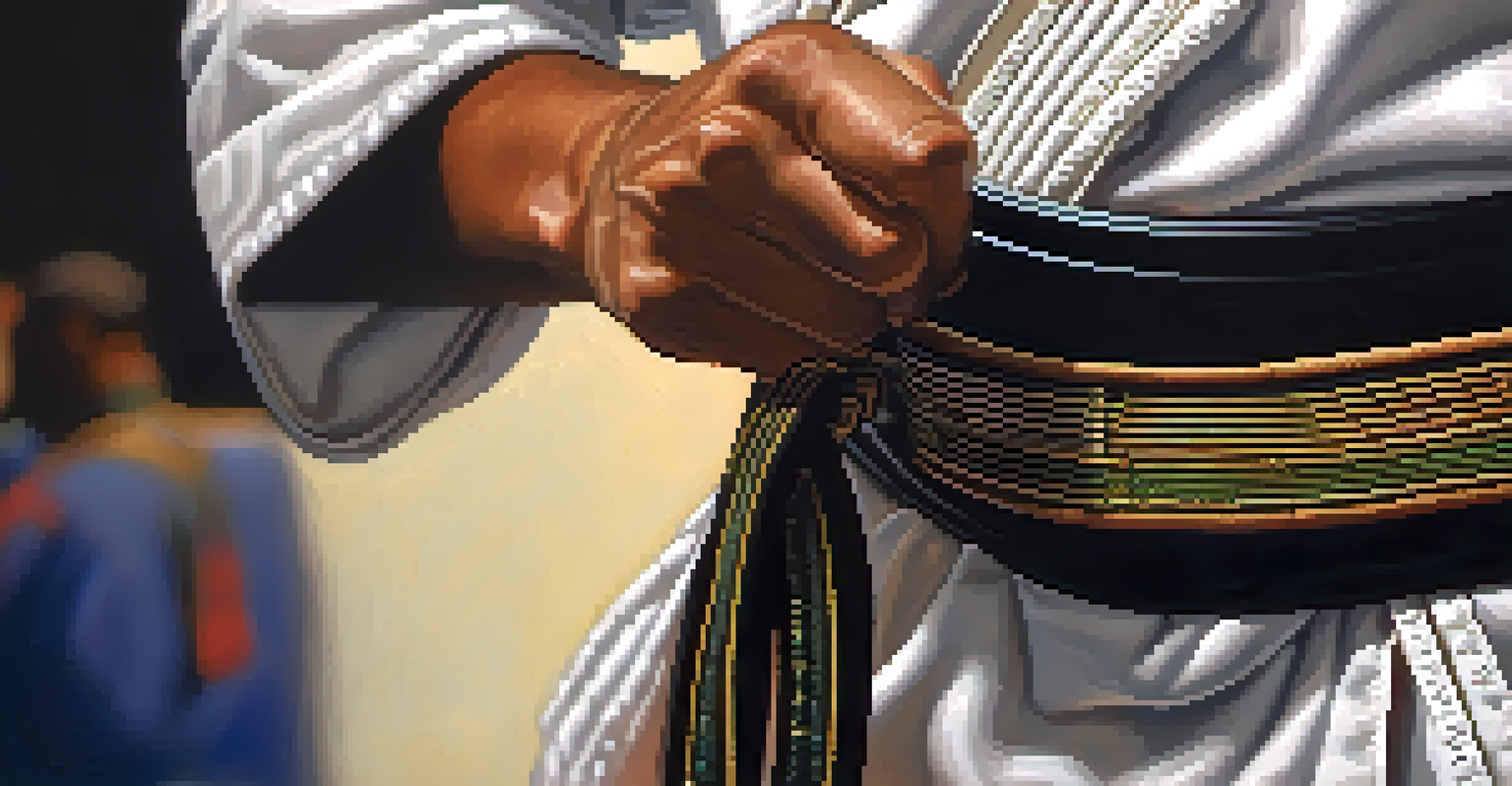The Role of Discipline in Martial Arts and Social Interactions

Understanding Discipline in Martial Arts
Discipline in martial arts is about more than just following rules; it's a way of life. Practitioners learn to focus their minds and bodies, honing their skills through consistent practice and patience. This dedication often transcends the dojo, influencing their behavior in everyday situations.
Discipline is the bridge between goals and accomplishment.
For example, a martial artist might spend hours perfecting a single technique, illustrating the importance of perseverance. This commitment teaches the value of hard work, which can be applied in personal relationships and professional environments. When you approach challenges with the same discipline, you’re likely to see improvements in various aspects of your life.
Ultimately, discipline becomes a foundation for growth, shaping not only martial artists but also the way they interact with others. The lessons learned on the mat foster resilience and a deeper understanding of respect, both for oneself and for those around them.
The Connection Between Discipline and Respect
One of the cornerstones of martial arts is respect, which is deeply intertwined with discipline. Students are taught to respect their instructors, fellow students, and the art itself. This respect fosters a sense of community, encouraging positive interactions among practitioners.

When respect is practiced regularly, it cultivates a culture of support and encouragement. For instance, a seasoned martial artist mentoring a beginner showcases how discipline in respect can lead to meaningful relationships. This creates an environment where everyone feels valued and motivated to improve.
Discipline Shapes Life Skills
Martial arts discipline fosters perseverance, emotional control, and respect, which enhance personal and social interactions.
As these relationships flourish, the social skills of practitioners also develop. They learn to communicate effectively, listen actively, and appreciate diverse perspectives, all of which are essential for successful interactions in daily life.
Discipline Enhances Emotional Control
Emotional control is another critical aspect of discipline, particularly in martial arts. Practicing techniques under pressure teaches individuals how to manage their emotions, whether it’s fear, frustration, or excitement. This skill is invaluable in social settings where emotions can easily run high.
Respect is the foundation of discipline, and practice is the key to mastery.
For example, a martial artist who has trained in high-stress situations is better equipped to handle conflicts calmly. They can approach disagreements with a level head, promoting constructive dialogue rather than escalating tensions. This ability to remain composed often earns them respect from peers.
Furthermore, this emotional intelligence can lead to healthier relationships. When individuals can regulate their emotions, they are more capable of empathy and understanding, which are key components of successful social interactions.
Building Self-Discipline Through Practice
Self-discipline is cultivated through rigorous training in martial arts. Practitioners learn to set goals, whether they are mastering a new move or preparing for a competition. This goal-setting process reinforces the idea that discipline is essential for achievement.
As martial artists progress, they experience the satisfaction of reaching their objectives, which boosts their self-esteem. This newfound confidence often translates into their social lives, where they feel more empowered to engage with others and take initiative in group settings.
Respect Builds Community Bonds
Practicing respect in martial arts cultivates a supportive community, encouraging positive relationships among practitioners.
Moreover, this self-discipline fosters a proactive mindset. When individuals approach social interactions with intention and purpose, they are more likely to build connections and establish lasting relationships.
Discipline and Conflict Resolution Skills
Martial arts training often involves learning how to defuse confrontations, a skill that is rooted in discipline. Rather than resorting to aggression, practitioners are taught to assess situations critically and respond thoughtfully. This approach is invaluable in everyday social interactions.
For example, a martial artist may utilize their training to navigate a heated discussion among friends, opting for a calm and reasoned response instead of reacting impulsively. This ability to stay composed can help resolve conflicts amicably, fostering stronger bonds among individuals.
Additionally, this mindset encourages a collaborative spirit. When people approach conflicts with discipline and respect, they are more likely to find common ground and work towards solutions that benefit everyone involved.
The Ripple Effect of Discipline on Communities
The influence of discipline in martial arts extends beyond individual practitioners to the broader community. As disciplined individuals engage with others, they inspire a culture of respect, patience, and cooperation. This ripple effect can create a more harmonious environment for everyone.
For instance, martial arts schools often host community events, fostering connections between students and locals. These interactions can lead to collaborations that benefit the community, such as charity events or self-defense workshops. When discipline is prioritized, the community thrives as a whole.
Conflict Resolution Through Training
Martial arts training equips individuals with the skills to manage conflicts calmly and collaboratively, strengthening social ties.
Moreover, disciplined individuals often become role models for younger generations. By demonstrating the importance of discipline, they encourage youth to adopt similar values, thus perpetuating a cycle of respect and positive social interactions.
The Lasting Impact of Martial Arts Discipline
The lessons learned through martial arts discipline can have a profound and lasting impact on social interactions. Practitioners carry these values into their daily lives, influencing their relationships and communities. The skills they develop—like respect, emotional control, and conflict resolution—are essential for nurturing positive connections.
As martial artists grow, they often find themselves in positions of leadership, whether in their careers or personal lives. The discipline they’ve honed enables them to inspire others, creating a positive feedback loop that encourages growth and development in those around them.

Ultimately, the role of discipline in martial arts transcends the dojo, shaping individuals into compassionate, respectful, and engaged members of society. By embracing these principles, we can all contribute to a more understanding and supportive world.